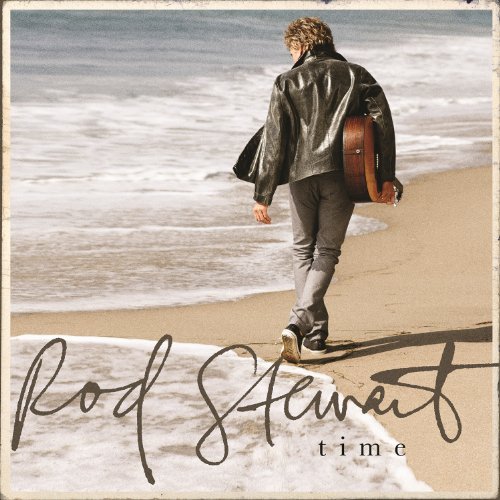
Rod Stewart
Time
Release Date: May 7, 2013
Genre(s): Adult Contemporary, Pop/Rock, Contemporary Pop/Rock, Album Rock
Record label: Capitol
Music Critic Score
How the Music Critic Score works
Buy Time from Amazon
Album Review: Time by Rod Stewart
Very Good, Based on 8 Critics
Based on rating 5/5
Rock's greatest interpretive singer wrote 11 of the 12 songs on his first album of original material in nearly 20 years. It's a companion of sorts to Stewart's endearing autobiography from last year; there's a song about his early days trying to make it as a singer ("Can't Stop Me Now"), one about divorce ("It's Over") and one about his bohemian younger days ("Brighton Beach"), and the music is usually either "Maggie May" sweet or spandex-slappingly loose. The songwriting is sometimes clunky or kind of silly (see "Sexual Religion"), but there's a lighthearted warmth on nearly every song.
Based on rating 4/5
In his hugely enjoyable autobiography, published late last year, Stewart devoted almost as much space to this new album as he did his entire recorded output over the last three decades. Having long been dependent on others’ songs Rod was enthusiastic about his author muse returning, which led to him writing, or co-writing, 11 of the 12 tracks on Time. Fittingly, it kicks off with a couple of autobiographical numbers; She Makes Me Happy catalogues the domestic bliss he currently enjoys, while Can’t Stop Me Now recalls his early struggles in the business, including reasons why doors were slammed in his face (“… your hair, your nose, your clothes”).
Based on rating 3/5
Rod Stewart's first album of original material in 20 years was prompted, he says, by writing his autobiography, and he wears his heart on his sleeve on wistful, nostalgic love songs (Brighton Beach) and thoughtful divorce laments (the single, It's Over). Musically, it runs the gamut of Rod from classic rock (opener She Makes Me Happy and the Celtic-tinged, triumphal Can't Stop Me Now) to the Do Ya Think I'm Sexy? era (Sexual Religion, which boasts a dark disco beat, synths and a throaty sax solo); Finest Woman is the Stones' Start Me Up and Little T&A rolled into one libidinous bundle, while a cover of Tom Waits's Picture in a Frame reminds me – not for the first time – how much the latter-day Mick Hucknall owes to the Rodster. The title track mixes organ, crunchy guitar and sweet backing vocals for the perfect rock ballad.
Based on rating 3/5
Although Rod Stewart's Great American Songbook interpretations of various classics sold well, he hadn't penned an album's worth of his own songs since 1991. His writer's block was finally banished when the 68-year-old looked back over his life for his recent autobiography. The best songs here are the most unashamedly nostalgic. The lovely Brighton Beach reminisces about youthful romance under the stars.
Based on rating 3/5
Rod StewartTime(Capitol)Rating: 3 out of 5 stars It’s going to take a lot more than this decent return to original rock songs—his first such release in over a decade– to erase the saccharine taste Stewart has left in the mouths of 70s fans. Recent years of well-meaning if smarmy interpretations into the great American songbook along with offshoots into soul, classic rock and Christmas chestnuts that often seemed phoned in were the definition of calculated. That’s something no one would have accused him of when he tore it up with scrappy performances as the swaggering frontman of the Faces and his early solo output.
Based on rating 6/10
Once he became a superstar, Rod Stewart essentially gave up on songwriting because, let's face it, it's easier to play endless football and cavort with models. Every once in a while his muse returned, so he tried a little bit harder, such as in 1988 when he spun Bob Dylan's "Forever Young" into a song of his own, which wound up as the last hit single of his that he ever wrote. After that, he floated through the '90s before finding a comfortable groove as an old-fashioned crooner in the new millennium, spending no less than a full decade revisiting songs from the Great American Songbook.
Based on rating 5/10
The big news here is that Time is not only Rod Stewart’s return to recording rock music but also marks his first collection of self-penned songs in decades. Such an enterprise—at least on paper—stands to re-institute some long-lost rock credibility for Stewart and to fulfill the hopes of long-suffering fans who have pined for a return to the style of Rod’s ‘70s glory days. Those fans have had little reason for faith over the last dozen years as they watched Rod reinvent himself as an interpreter of pop standards with his five-part Great American Songbook series.
Opinion: Very Good
ROD STEWART “Time” (Capitol) Rod Stewart has turned out to be one canny codger. He was in his late 50s when his long string of rock hits stopped, and writer’s block struck. So he applied his sandpaper voice to prerock standards, restarting his career and selling at least a million copies of each of the first four volumes of his “Great American Songbook” series in the early 2000s.
'Time'
is available now

